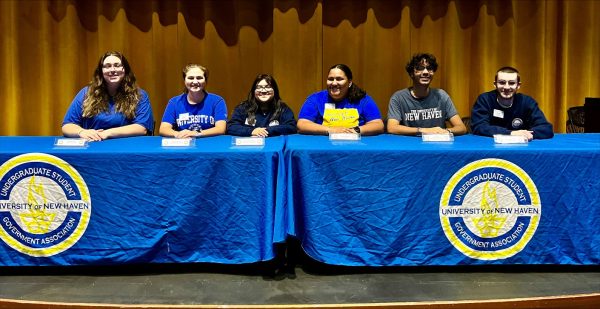Student overpopulation exposes lacking infrastructure
The University of New Haven has experienced rapid growth in recent years. Under former university President and Chancellor Steven Kaplan, the school saw a 65% increase in student population since 2004, a major change for a smaller university. Every year, it seems as if there is a new “record setting” class size, and dorms become increasingly packed with new students.
This year, the university is welcoming 1,250 new first-year students, most of whom are living on campus, and 200 transfers. This is in addition to the class of 2023 having 1,300 students, class of 2024 with 1,400 and 1,350 in the class of 2025.
While this level of growth is great for the university and all its students, there are some foundational aspects that are lacking.
For example, the parking issue is problematic and well documented. This is in large part an outcome of student overpopulation creating an influx of cars and the need for more expansion.
Students living on campus are forced to park their cars in lots off Main Campus, primarily on North Campus, creating a slight inconvenience in the ease of access. This is also compounded when, in the fall, students are required to move their cars on some weekends because of football games. Though the parking program pauses on the weekends, it can sometimes make it difficult for commuters to then find parking as well.
Considering the concerns surrounding campus safety in the current and recent semesters, the university is left to consider the risks of requiring students to park in distant locations, and walk independently to their cars.
Commuters have it rough as well. With there being a finite amount of housing on campus (2,800 students according to the 2022 New Haven fact sheet) and a seemingly constant growing student body population, many students opt to move off campus. 48% of the undergraduate community lives off campus, and class schedules create bottlenecks of on-campus traffic throughout the day.
Many members of the classes of 2022 and 2023 remember being placed into forced triples, something that is much rarer in the post-COVID university community. With there only being so many rooms available, will the school choose to return to a forced-triple rooming situation in the coming years?
The university continues to push the limits of their acceptance and add more students. After recent years, the acceptance rate has seen a bump to 94% as of Fall 2021. While much of this is due to New Haven not receiving as many applications as more well-known universities, it does call into question its “selectiveness.” This could potentially impact the perception of its education quality, even when programs are well-versed and effective for students. Additionally, if they keep going in this direction, their lack of on campus housing will become an issue.
The university has made it clear that they want to grow, but there are some obstacles that stand in the way of that. First, because of the university’s location there is only so much room for further expansion. Campus is surrounded by neighborhoods, and any expansion would need to begin there.
University-sponsored off-campus housing has also become more popular in recent years, with the introduction of the Savin and Parkview housing options. They would likely need to add more of these to account for any student increases.
We are all for growing this university and increasing the resources it may have available. There is a clear desire from the administration to do this, and it is something that could certainly continue to progress. However, in doing so, there are certain things that need to be taken into consideration to handle the growth.




